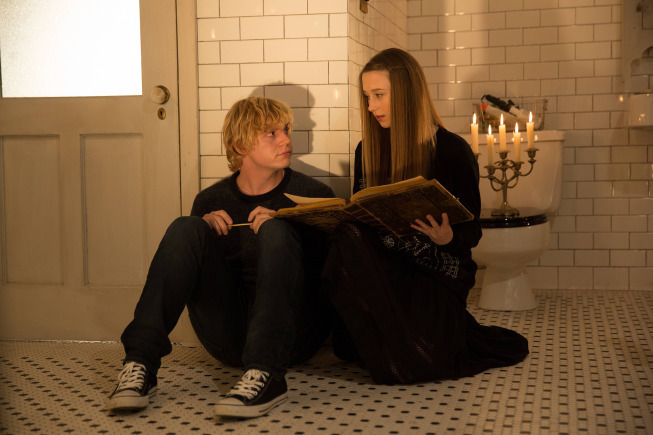The Problem with 'American Horror Story'

Casey Duby / Emertainment Monthly TV Section Editor
The FX anthology series is one of the most unique and impressive shows I’ve ever seen. As someone with no acting training whatsoever, I can see the huge challenge the cast takes on in playing sometimes several characters per season and changing it up every year. Being considered, until recently, a limited series, each season tells a complete story in just ten episodes, and while some recent seasons have had callbacks to past years, each theme has its own, original vibe.
Because of all this, I binged the first four seasons several years ago and loved every minute. However, the fifth season, “Hotel”, stopped me in my tracks and pulled me out of the show’s momentum almost immediately. It wasn’t until very recently that I was able to talk myself into finishing the storyline, as well as all the subsequent seasons. I’m glad I did this because the show never lost the many things that I loved about it. In fact, in some ways it’s grown even stronger over the years. However, that nagging flaw that pulled me out of the show and kept me away for so long has persisted in every season since Hotel.

The premise of “Hotel”, laid out in the opening episodes, felt like a cinematic and compelling take on the trope of a haunted hotel. A detective, already on the brink of insanity, checks into a hotel in the midst of a murder investigation, only for the hotel’s haunted residents to play with his head even more. However, instead of fully exploring this story’s full potential, it got lost among the season’s many plotlines that got thrown into the season. “Hotel” was also about a vampire-like family (that turned into a horde of vampire-like children), violent ghosts of the hotel, and drama with the hotel’s less aggressive spirits. There was simply too much going on for all of these separate elements to be satisfyingly resolved in only ten episodes. This, paired with the stylistic choice of making the season heavy with gratuitous sex and violence, made the vast majority of the episodes simply a graphic mess.
Yet, just as the introductory episodes were compellingly well-executed, the final episodes of the season were clear and purposeful. The season concluded on a surprisingly uplifting note, with the lonely and rejected-feeling benevolent undead, played by Denis O’Hare and Kathy Bates, taking over the hotel and ending its reign of death. Their rise within the hotel pulled at the heartstrings as Denis O’Hare’s transgender Liz Taylor emotionally reunited with their long-estranged son. Kathy Bates’ Iris was pulled from the edge of suicide after being convinced of her worth.

“Apocalypse” was the season in which this tendency was most noticeable. A truly jam-packed season, the story opened with civilization’s impending doom being narrated on the news. A wholesome teenager was wrenched from his family by stoic government officials and thrown into a cage, purportedly because of his genetic superiority. At its onset, “Apocalypse” seemed to be taking the angle of the government driven to extremes in the face of human extinction. However, the season suddenly switched gears as the few survivors of apocalypse-inducing blast were taken to an archaic bunker where a dystopian hierarchy had already been established. After fleshing out these characters, “Apocalypse” changed direction a third time. The season then became a throwback to past seasons, with the witches from “Coven” playing an important role. There was even an episode titled “Return to Murder House”, with every major character from the first season reprising their role. Finally, after many flashbacks and nostalgic moments, the audience understands not only who brought about the apocalypse and how the witches fit in, but also that the majority of the characters who were originally brought to the bunker are unimportant to the rest of the plot. Before arriving to their conclusion, “Apocalypse” takes a final turn, where, mid-flashback, we see the antichrist, Michael Langdon (Cody Fern), planning the apocalypse with tech whizzes from the Illuminati.
Once again, the season concluded strongly, but not before hurriedly wrapping up its several takes on the apocalypse theme that it crammed into its short season. Every plotline had merit; an unchecked government, a dystopian society, a nostalgic war between witches and warlocks, and tech-savvy radicals pushed to extremes would have all made great stories. But all four at once? Not one of them was able to reach their full potential.
“Cult” suffered from the same shortcoming. Originally a chilling depiction of a violent radical working his way into public office with the support of his murderous following, the season felt unsettlingly plausible. By the end, “Cult” was about a man who idolized Charles Manson, obsessed with obedience and dominance, surrounded by dozens of identical, robotic worshippers. Maybe this transformation was intentional, but everything from tone to theme was different from the beginning of the season to the end. If the season was intended to be a realistic exploration of the possibilities of an extremist gaining power, that story should have been seen through. Were it intended to be a take on the frightening depths of cults, this plotline could have been reached much sooner without the unnecessary development of characters who end up becoming much less relevant than they seem.

I have yet to see “1984”, but I’m eager to watch it and can only hope that it managed to escape the fatal flaw that has plagued an otherwise phenomenal series.